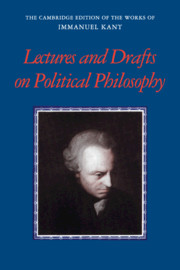Book contents
- Frontmatter
- Contents
- General Editors’ Preface
- Acknowledgments
- General Introduction
- Translators’ Remarks
- Reflections on the Philosophy of Right
- Natural Right Course Lecture Notes by Feyerabend
- Drafts for Published Works
- Drafts for Theory and Practice
- Drafts for Towards Perpetual Peace
- Drafts for the Metaphysics of Morals
- Drafts for Conflict of the Faculties
- Glossary
- Topical and Chronological Concordance
- Editorial Notes
- Index
Drafts for Conflict of the Faculties
Published online by Cambridge University Press: 10 December 2020
- Frontmatter
- Contents
- General Editors’ Preface
- Acknowledgments
- General Introduction
- Translators’ Remarks
- Reflections on the Philosophy of Right
- Natural Right Course Lecture Notes by Feyerabend
- Drafts for Published Works
- Drafts for Theory and Practice
- Drafts for Towards Perpetual Peace
- Drafts for the Metaphysics of Morals
- Drafts for Conflict of the Faculties
- Glossary
- Topical and Chronological Concordance
- Editorial Notes
- Index
Summary
Loses Blatt F1 (fall 1795–fall 1797)
Why has there never been a monarch who has risked declaring openly that he thinks nothing of the concept of right and takes it to be mere pedantry and that the people must be satisfied with that and will be if they only conduct themselves passively under his governance and simply let him lead them and care for them as a shepherd does a herd of sheep, and thereby really feel themselves comfortable and well-off and that his people are also completely satisfied under his governance, which is often the case: why does he consider himself required in each of his decrees to feign respect for the right of the people (although he has none) and why does he fear, not without reason, that such a naive declaration should completely alienate the people from him. – The reason is not to be sought in a claim that the concept of right and its principle would be a concept that unites all natural aims of the people and its whole interest, so that the well-being of the people is made into a motivating ground of obedience for the people; instead in the eyes of the people right has for itself its unconditioned highest worth to which they pay homage, and the politician considers himself, against his will, constrained by the concept of right as to a point lying outside the sensible world but connected to it, like Archimedes placing his lever in order to move the world when he wants, because of the expected benefits and happiness; a state that is absolutely monarchical and wisely administered governed but merely passive also really inclines to these benefits and happiness; more than a state in which is found the turbulence resulting from having been led around by the voices of the majority, which is a state that achieves nothing.
Loses Blatt E 77, four pages (dated after September 29, 1797, St.Michael's 23:461 Day)
- Type
- Chapter
- Information
- Kant: Lectures and Drafts on Political Philosophy , pp. 359 - 367Publisher: Cambridge University PressPrint publication year: 2016

